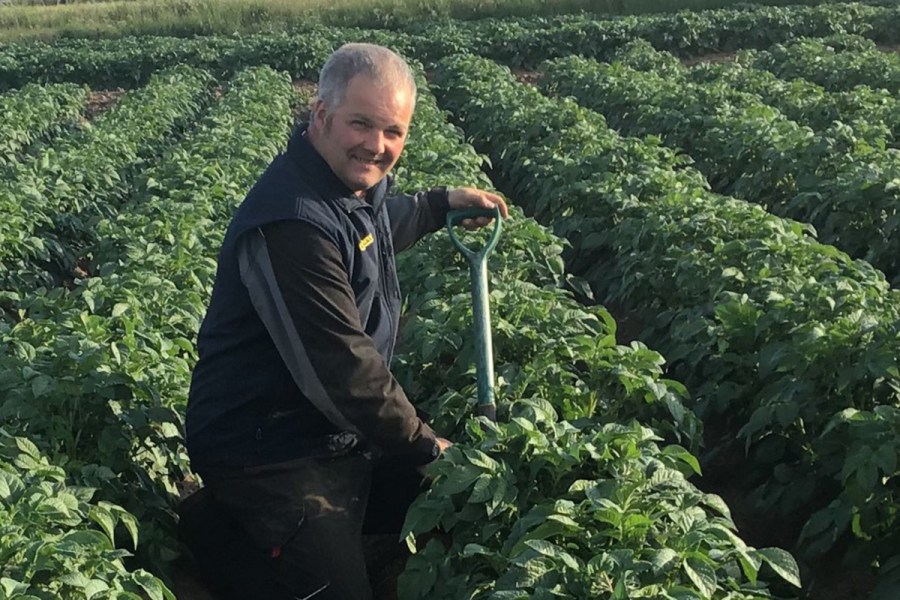By Andrew Wilson
A lot can change in a few weeks and sometimes that’s a good thing – since my last column, we’ve had triumph, challenge, disappointment and disaster!
The triumphs include a spring bean result far better than I’ve previously experienced. Yield touched 7t/ha at 23% moisture, quality was good so attracted a premium for human consumption which paid for the drying, and we planted the following wheat in good order before the next deluge. I even sold them reasonably well.
We harvested a third of our sugar beet on 30 October which for a May-sown crop, wasn’t too shabby at 64t/ha. Sugar average was 17.33% and dirt 3.2%, both the right side of the respective factory averages.
So, potatoes. Despite better-than-expected quality, yields are the worst I can remember for some years – we’re 30% down on target which is going to hurt cashflow and enthusiasm.
There’s no major reason that I can pinpoint – late, cold and wet planting, seed issues, a fortnight of high heat then two months of cold wet dreary weather before another heatwave that shut some crops down when they should have been bulking hard. Still, our markets seem to be in denial and are slow to take responsibility for the elements that they control, which is a contributing factor to both current results and future vision.
The industry has survived on eternal optimism for too long, in my opinion. I’m old enough to remember when we had the following year’s contract prices by June to enable us to negotiate land, source inputs, plan and forecast – they were at a level that left a profit worthy of making investments in too.
All that seems a long time ago in today’s world of volatility, escalating costs, data harvesting, manipulated weather, foreign competition and clipboard epidemics. I believe the tide’s turning, but not anything like quickly enough to be meaningful, not yet anyway.
Twelve years ago I made a list of kit that I could line up in a field and sell, should I decide to cease my lifetime’s run of being a potato grower. Back then we grew significantly more than now, but it came to more than a grand an acre. That same equation now results in more than double that figure. Add to it the working capital tied up in the crop and the total would clear every debt we have, allow significant investment in assets and still leave the bank statement printed in black ink.
Tempting? Definitely. Likely? Not impossible, but it’s a big part of me and I’m stubborn, determined and proud. I’m also tired, fed up, skint and not afraid of change. Conversing with other growers, I’m not alone – will the penny drop with those with the power to turn the tide?
Some readers will undoubtedly be aware of my drill collection which was at times, an eye-roller for my late father, but it gives us options, flexibility and capacity.
Our direct disc-drilled cover crops this year look universally dreadful due to a combination of hot dry conditions for the earlier sown fields and cold wet conditions in those later sown. One must console one’s self that the good stuff happens underground.
Our strip-till drill has covered more area this year than in 2022 and 2023 seasons combined, and continues to impress as we learn how and when to use it. One such occasion recently was to patch in wheat that was flooded off back in early October, whereas another was sowing a wheat and bean intercrop as part of a nitrogen use efficiency trial upgrade.
Minister Steve Reed says we must do more with less, but as usual he’s behind – we’ve been doing that for years!
Politics are notoriously short-term in thinking and forever an incompatible bedfellow to a long-term industry like farming, however can’t be ignored. I try to not worry about things beyond my control but it’s easy to ponder ‘what next’. IHT seems to be a decoy to shroud things such as an impending fertiliser tax, which will undoubtedly filter through to aspects like steel and cement which alongside the NI hike, is going to hammer our supply industry and customers to an equally destructive level.
Speaking of bureaucracy, last week I had a quarterly vet inspection of my pigs – something I’ve no objection to and feel should be more than adequate to cover anything the four additional pig assurance schemes could ever wish for. Alas, this isn’t currently the case and an hour later the Red Tractor pig inspector arrived. We passed both.
I guess it’s a warm-up for the marathon that’ll be my ACCS and AP inspection next week – last year it was a nine-hour endurance, it’s just a shame it doesn’t bring a reward to mirror the level of headache.
May I take this opportunity to wish you some festive regards – take comfort in the solidarity that we’re all navigating the same choppy tides and give the calculator a few days off while we tuck into some proper British produce – while we still can.
Happy Christmas!
This article was taken from the latest issue of CPM. For more articles like this, subscribe here.
Sign up for Crop Production Magazine’s FREE e-newsletter here.




